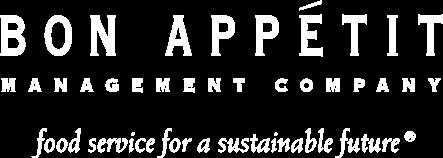

FOOD ALLERGIES & CELIAC DISEASE
AT THE UNIVERSITY OF PENNSYLVANIA

OUR FOOD PHILOSOPHY
At Bon Appétit, we plan café-specific menus and cook from scratch in each location. From simmering stocks to finishing sauces and roasting meats, our approach allows us to provide fresh foods from whole ingredients. This allows students to customize many café options to meet their personal dietary needs.
Bon Appétit at the University of Pennsylvania safely serves students with food allergies every day. We have clear and concise protocols that account for our open kitchens and scratch-cooking methods to ensure allergens are handled and labeled appropriately. We also look to the recommendations from expert professional organizations, such as Food Allergy Research & Education (FARE), to guarantee our approach remains current and reflects best practice guidelines.
We would love to hear from you and can assist you in identifying food choices. If you have food allergy concerns, our well-trained chefs and registered dietitians are here to assist you with menu options that meet your dietary needs. While our culinary teams receive significant training about food allergens, please keep in mind that our dishes are prepared in open kitchens and the top-9 allergens are present in all Bon Appétit cafés.�

YOUR RESOURCES AT-A-GLANCE
• An individual meeting with a registered dietitian nutritionist (RDN) on our Wellness Team to help you develop a plan to navigate your dining options. They can also help address ongoing questions and concerns as well as connect you with café managers.
• An introduction to the dining management team, giving you direct access to individuals responsible for food preparation.
• Online menus for each dining location at university-of-pennsylvania.cafebonappetit.com.
Online menus list all ingredient and allergen information for house-made items.
• Access to purchased ingredient food labels in the café, upon request.*
• Fresh gloves, utensils, and/or pans at made-to-order stations to reduce crosscontact concerns, upon request.*
• Portions of food served directly from the kitchen batch that have not been on the service line, upon request.*
• Dedicated stations that avoid the top-9 allergens and gluten in select cafés.
*Please direct these requests to a café manager.�


INGREDIENT TRANSPARENCY
Bon Appétit at the University of Pennsylvania communicates about the top-9 allergens and gluten using quick reference icons and descriptive menu nomenclature.
Icons for the top-9 allergens and gluten can be found on online menus and daily café signage. Icons, recipes, and purchased products are regularly reviewed for accuracy by our culinary and wellness teams.�
Online menus also list the ingredients for all house-made products. We cook from scratch using whole, seasonal ingredients, so this strategy covers the vast majority of our menu items fully. However, purchased sub-ingredient information (for example, tamari) will not be listed online. This information will always be available in our café upon request. This allows us to provide the most up-to-date information to our guests in real time.
We also ensure that the name of the dish, or its restaurant-style description, references any cooking methods which may increase the risk of cross-contact, such as frying. This provides students with much of the information they need while also letting them know when they may need to ask further questions.
Example: house-fried tortilla chips�
PEANUT
SPECIALTY SOLUTIONS
SimplyOASIS
We understand that students with common food allergies and celiac disease want a safe place to make food choices, quickly. To allow you to have readily available options that meet your needs, we offer SimplyOASIS.
The SimplyOASIS station features meals that celebrate fresh and simple single ingredients while avoiding the top-9 allergens and gluten. SimplyOASIS stations are available at 1920 Commons and Hill House.
Enhanced protocols to avoid cross-contact are followed at SimplyOASIS stations. SimplyOASIS menu items are prepared in separate, dedicated areas and utilize dedicated cooking equipment. All cooks who prepare food for this station are required to pass an annual SimplyOASIS certification.
Made Without Gluten-Containing Ingredients (MWG-CI) Pantry
1920 Commons and Hill House offer a pantry dedicated to providing foods made without gluten-containing ingredients. The MWG-CI Pantry is stocked with highly requested packaged, manufacturer-certified gluten-free items, such as breads, desserts, and retail-style frozen items. The pantry includes a dedicated toaster oven and microwave to be used solely for products stocked within the pantry.
Access to the pantry is limited. To ensure fair treatment of all students, we partner closely with Disability Services on approvals for MWG-CI Pantry access. Disability Services contact information can be found under Contacts on page 8.
Pre-packaged breads and desserts made without gluten-containing ingredients can be found in additional residential dining cafés.

SPECIALTY SOLUTIONS
Avoiding Nuts?
Within our residential cafés, we do not use peanuts or tree nuts as ingredients in the preparation of menu items.
To be more specific, within our residential cafés we have:
• Eliminated purchases of all peanut and tree nut varieties, with the exceptions listed below.
• Eliminated purchases of products with peanuts and tree nuts in the contains statement, including dessert items.
However, there are places students may find peanuts and/or tree nuts within residential dining:
• Individually sealed packets of peanut butter for individual guest use.
• Almond milk is available as a non-dairy alternative at the alternative milks station. Almond milk is kept in its original container and is not used in the preparation of any dish.
• Coconut and its derivatives may be used. Please note that as of January 2025, the FDA no longer classifies coconut as a tree nut for allergen labeling purposes. Penn Dining will no longer label coconut as a tree nut beginning in the Fall 2025 semester.
• Purchased breads and desserts may come from suppliers that use a shared facility; however, we will provide ingredient labels for guests to review upon request.
We cannot guarantee these allergens have not been introduced during a previous stage of the food preparation process or through accidental cross-contact from outside sources.
Guests with food allergies or specific dietary concerns should speak with a manager for individualized assistance.

YOUR RESPONSIBILITIES
Students also have a responsibility for communicating and managing their food allergy(ies).
• Understand your food allergy(ies). Recognize common sources of, and avoid, foods to which you are allergic. Know the signs and symptoms of a reaction, and carry any medication prescribed to you for food allergen management.
• Notify appropriate parties of your allergy(ies). You are encouraged to contact Sarah Goff, RDN, Wellness Manager for Bon Appétit at Penn Dining, at sarah.goff@cafebonappetit.com to discuss specific nutrition and allergen concerns.
We also request that you work through the university’s accommodations process by contacting Disability Services at the Weingarten Center.
• Review menus for food allergens. Online menus can be accessed at university-of-pennsylvania.cafebonappetit.com.
• Get to know your chefs. If you have a question at any point, please ask! Our chef managers are trained to assist you in the café. Chef managers can be identified by their dark gray chef coats. If you have difficulty locating a chef manager, please ask a staff member for a manager and someone will meet you.
• Take steps to avoid cross-contact. Cross-contact occurs when a food comes into contact with another food and their proteins mix, creating the potential for accidental exposure.
- Make selections from served stations.
- If eating from a self-serve area, speak with a manager for the best options to avoid cross-contact. Self-serve areas put guests at substantial risk of cross-contact from other guests.
- In either service style (served or self-serve), guests may ask a manager for a portion from a batch of food that has not been out on the service line.
- Guests may ask dining employees to change their gloves and to use a new utensil and fresh pan at made-to-order stations.
- Avoid eating deep-fried foods unless it is served at the SimplyOASIS station. Fryer oil may be used for multiple types of foods; this can lead to cross-contact with foods previously cooked in the fryer.
• Keep an open dialogue. Let our management team know what’s working, what’s not, and when in doubt, ask questions. If we do not hear from you, we believe that you are successfully navigating the dining facilities.
IN CASE OF A REACTION
FACE
itching, redness, swelling
AIRWAY
trouble breathing, coughing, wheezing, trouble swallowing and speaking
STOMACH
pain, vomiting, diarrhea, nausea
TOTAL BODY
hives, rash, weakness, paleness, sense of doom, loss of consciousness
If you or someone you know has signs of an allergic reaction, please take the following steps:
1. Get help immediately. Call Penn Police at 215-573-3333 or indicate to someone that you need them to call for help on your behalf. Do not go back to your room by yourself.
2. Administer epinephrine and/or other medication as prescribed by your physician.
3. Follow-up with your physician or a medical provider.
4. Notify Penn Dining at dining@upenn.edu as soon as possible so they can address your concerns, begin an investigation, and help make adjustments to your eating plan if needed.
If you have been prescribed an epinephrine auto injector, you should carry it with you at all times. Bon Appétit cannot store personal medications on behalf of students and guests.
Penn Dining Points of Contact
Sarah Goff, RDN
Wellness Manager, Bon Appétit at Penn Dining sarah.goff@cafebonappetit.com
Visit the Meet the Team page at university-of-pennsylvania.cafebonappetit.com to connect with additional Bon Appétit chefs and managers at the University of Pennsylvania.
Finding a Café Manager
Meet the Manager signs display photos of our managers and are posted at the entrance of all cafés. Chef managers can be identified by dark gray chef coats.
If you cannot locate a manager, please ask any of our staff members to speak with a manager and someone will meet you.

Cafebonappetit.com university-of-pennsylvania.cafebonappetit.com
Meal Plan Accommodations and Exemptions
Students requiring dining accommodations or seeking meal plan exemptions must work with Disability Services. Please follow the instructions on the Getting Started webpage for the MyWeingartenCenter Student Portal to submit your request.

MyWeingartenCenter Student Portal https://weingartencenter.universitylife. upenn.edu/disability-services/
Questions?
Answers to commonly asked questions can be found on our website at university-of-pennsylvania.cafebonappetit.com. Please direct additional questions to Sarah Goff, RDN.�

